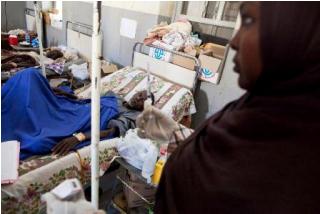EU pledges 14.5m euros for health services in Sudan
April 22, 2013 (KHARTOUM) – The European Union announced on Monday it will sink more than 14.5 million euros ($18.8 million) into health-related programmes in Sudan in an effort to strengthen the sector.

The two-day workshop, which aims to highlight the impact of politics on health issues, will debate work papers on health policies, and is also being attended by a number of ambassadors, diplomats, Sudanese government officials and representatives from international health organisations.
In his speech, Ulicny said the EU’s commitment to Sudan was aimed at strengthening relations between the two parties, saying strong engagement from all sides was needed to reach the goal of “a prosperous, safe and healthy population in Sudan”.
“Aware of the importance of health as a basic right and a factor fostering stabilisation and development, EU is engaging to support Sudan in this crucial sector,” he said.
“[In] the current political and economic context, the EU stands ready to provide support [to] the Sudanese population to improve equitable access to health services”, he added.
The EU contribution includes 12 million euros for strengthening health services in Kassala, Gedaref and Red Sea states according to priorities identified in the national health sector plan.
A further 1.5 million euros has been allocated for the Darfur Basic Services Project targeting maternal health in South and East Darfur states by training midwives and nurses, while more than 1 million euros will be channelled through grants supporting non-state actors to address basic health services.
In recognition of the difficulties encountered in developing sector strategies, Ulicny said the EU is also providing a 23 million euro financial contribution to support policy dialogue on national health policies, strategies and plans in seven countries, including Sudan.
Ulicny said advancing global health remained one of the EU’s top priorities, saying that addressing ongoing disparities was crucial to bringing stability in the developing world.
Recognising the close inter-connections between health and foreign policy, as well as its relationship to other sectors, including education, economics, trade and agriculture, Ulicny said the EU was working to address health issues via a complex network of different actors in public and private sectors, disciplines and politics.
“The importance that the EU attaches to global health is well illustrated by the financial effort of the EU, and the volume of the EU funding to health-related programmes,” he said.
Ulicny also announced that the EU would continue its support to the global health sector with an additional contribution of 6 million euros.
At international level, the EU has invested some 83.4 million euro in the GAVI Alliance which works to save children’s lives through immunisation and continues to support the Global Fund to Fight AIDS, Tuberculosis and Malaria, providing 54% of total funding since its inception.
Last November, the Sudanese health minister Bahar Idris Abu Garda called on the ministry of finance to increase the salaries of all doctors working in remote areas, conceding the lack of medical personnel in Sudan, particularly the lack of specialists in peripheral states presented key challenges in the sector.
(ST)
